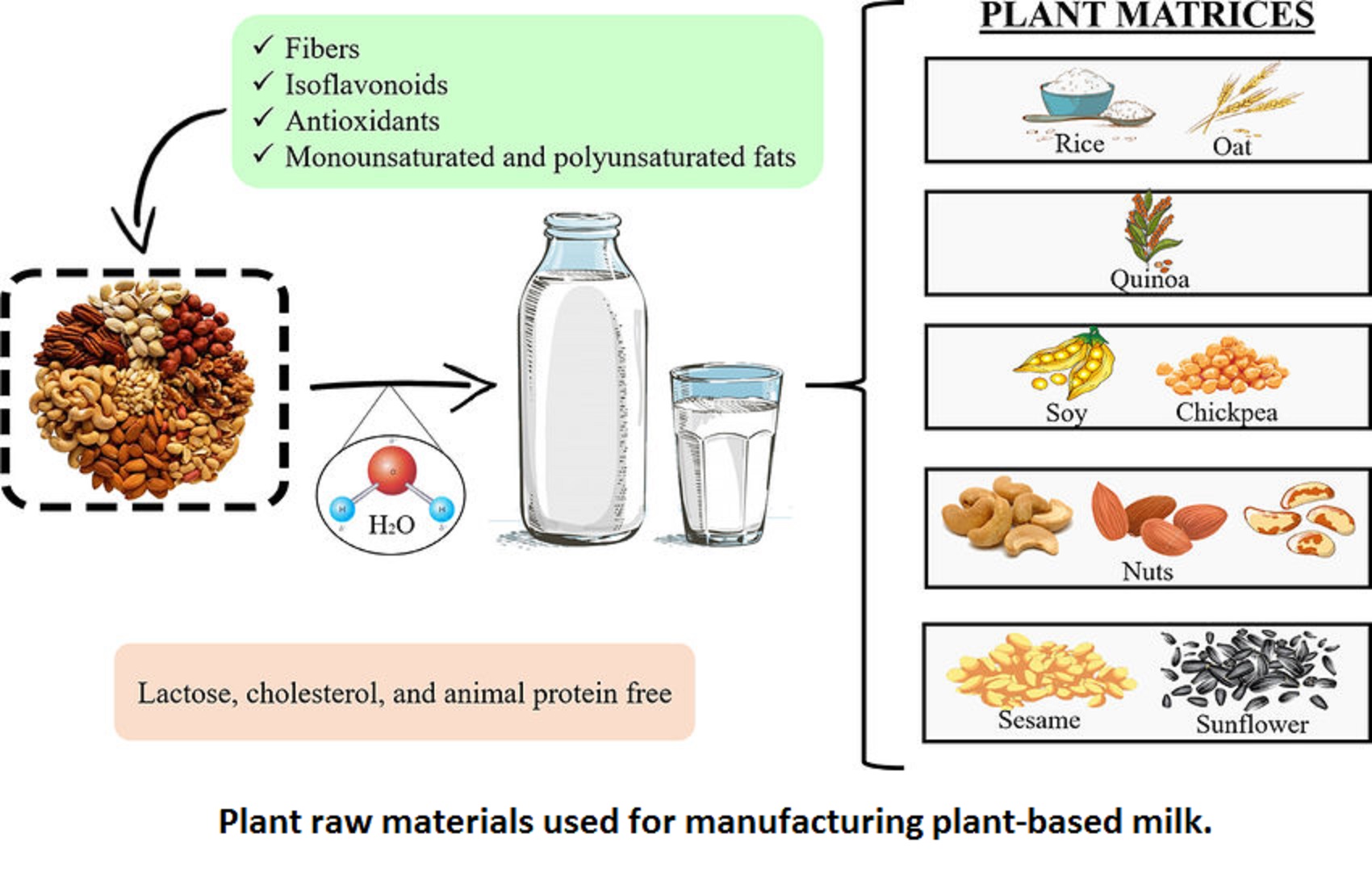Dairy refers to products derived from milk, typically produced by mammals such as cows, goats, or sheep. It is a common food group that provides a range of essential nutrients and has been consumed by people throughout history. Dairy plays an important role in supporting our overall health, growth and development. It has been specifically associated with a positive impact on bone health, improved cardiovascular health and its beneficial content for muscle growth, repair and recovery for athletes.
Although dairy products are an essential part of people’s diet, its important to note that some people are prone to lactose intolerance or have dietary restrictions that prevent them from consuming them.
It is interesting to note that in the United States, retail sales of plant-based milk alternatives have reached $3.1 billion, while worldwide sales have reached $20.9 billion.

Types Of Dairy Products
- Milk: The most basic and widely consumed dairy product. It can be further categorized into whole milk (full fat), low-fat milk, and skim milk based on the fat content.
- Cheese: It is made by coagulating milk and separating the curds from the whey. There are numerous types of cheese, including cheddar, mozzarella, Swiss, and feta, each with distinct flavors and textures.
- Yogurt: Produced by fermenting milk with specific bacteria cultures. Yogurt comes in various forms, such as regular, Greek, or flavored options, and can be consumed on its own or used in cooking and baking.
- Butter: A solid fat made from churning cream or milk. It is commonly used as a spread and used for cooking purposes.
- Cream: This is the fatty part of milk that rises to the top. The cream can be used in recipes, added to coffee, or whipped to make whipped cream.
Nutritional Composition
Dairy products are known for their rich nutrient profile, including:
- Protein: Dairy is a source of high-quality protein, containing all essential amino acids necessary for bodily functions and tissue repair.
- Calcium: Dairy products are one of the main dietary sources of calcium, which is crucial for bone health, nerve function, and muscle contractions.
- Vitamin D: Some dairy products, such as milk, are fortified with vitamin D, which aids in calcium absorption and supports bone health.
- Vitamins and Minerals: Dairy products also provide essential vitamins and minerals like vitamin B12, riboflavin, phosphorus, and potassium.
- Fats: Dairy products can vary in their fat content, ranging from low-fat options to full-fat varieties. Fats in dairy contain a mix of saturated, monounsaturated, and polyunsaturated fats.

Bone Health: Role In Promoting Strong Bones And Preventing Osteoporosis
Bone health plays a critical role in promoting strong bones and preventing conditions like osteoporosis. Here are some key aspects:
- Calcium: Calcium is a primary nutrient for bone health. It helps in building and maintaining strong bones and teeth. Adequate calcium intake throughout life, especially during childhood and adolescence, is crucial for optimal bone mineralization.
- Vitamin D: Vitamin D aids in calcium absorption from the intestines and promotes its utilization for bone mineralization. It also plays a role in regulating calcium levels in the blood. Insufficient vitamin D levels can lead to weakened bones and an increased risk of fractures.
- Physical Activity: Regular weight-bearing exercises and strength-training activities help stimulate bone remodeling, strengthening the bones. Examples include walking, jogging, dancing, weightlifting, and resistance exercises.
- Balanced Diet: Consuming a well-balanced diet rich in essential nutrients, including calcium, vitamin D, protein, and other bone-supportive vitamins and minerals are important for maintaining bone health.
- Avoiding Tobacco and Excessive Alcohol: Smoking and excessive alcohol consumption can negatively impact bone health and increase the risk of osteoporosis.
- Hormonal Balance: Hormonal imbalances, such as low estrogen levels in women during menopause, can contribute to bone loss. Managing hormone levels through appropriate medical guidance is essential.
Cardiovascular Health And Dairy
Dairy products have been studied for their potential impact on cardiovascular health, particularly in relation to blood pressure regulation and heart disease risk. Here are some key points:
- Blood Pressure Regulation: Some research suggests that including dairy products as part of a balanced diet may have a beneficial effect on blood pressure regulation. Dairy’s content of calcium, potassium, and bioactive peptides may contribute to lowering blood pressure levels. However, individual responses may vary, and it’s important to consider overall dietary patterns and individual health conditions.
- Heart Disease Risk: The relationship between dairy consumption and heart disease risk is complex and not fully understood. Some studies have found that consuming moderate amounts of dairy, particularly low-fat or reduced-fat options, may be associated with a lower risk of heart disease. However, other factors such as the overall quality of the diet, individual health status, and lifestyle choices also play important roles in cardiovascular health.
- Moderation and Overall Dietary Pattern: As with any food group, moderation is key. Including moderate amounts of dairy products within a balanced diet, rich in fruits, vegetables, whole grains, lean proteins, and healthy fats, can contribute to a heart-healthy eating pattern. It’s important to consider the overall dietary context and individual health needs when evaluating the impact of dairy on cardiovascular health.
Impact Of Dairy Products On Gut Health And Digestion
Gut health is influenced by various factors, including diet, and dairy products can play a role in supporting a healthy gut microbiota and digestive system. Here are some key points:
- Probiotics: Some dairy products, such as yogurt and fermented milk, contain beneficial bacteria known as probiotics. Probiotics can help promote a healthy balance of gut bacteria, supporting proper digestion and nutrient absorption.
- Lactose Intolerance: It’s important to note that individuals with lactose intolerance may have difficulty digesting lactose, the sugar found in milk. In such cases, lactose-free or lactose-reduced dairy products or dairy alternatives can be consumed to avoid digestive discomfort.
- Calcium and Fiber: Dairy products, particularly low-fat or reduced-fat options, can contribute to overall dietary calcium intake, which is important for bone health. Additionally, some dairy products, such as yogurt, may provide dietary fiber, which supports healthy digestion.
- Individual Variations: Each person’s gut microbiota is unique, and individual responses to dairy consumption may vary. Some individuals may find that certain dairy products do not agree with their digestive system or cause discomfort. In such cases, alternatives like lactose-free products or non-dairy sources of nutrients can be considered.
- Overall Dietary Pattern: Gut health is best supported by a diverse and balanced diet that includes a variety of fruits, vegetables, whole grains, lean proteins, and healthy fats.
Allergy And Intolerance Considerations
Allergy and intolerance considerations related to dairy involve common dairy-related allergies and lactose intolerance, as well as alternative options. Here are some key points:
- Dairy Allergies: Dairy allergies are immune responses triggered by proteins found in dairy products, most commonly casein and whey. Symptoms can be mild or severe and may include hives, swelling, digestive issues, or even life-threatening reactions. Common dairy allergies primarily affect children but can persist into adulthood. In cases of dairy allergies, complete avoidance of dairy products is necessary. Alternative options such as plant-based milk (e.g., soy milk, almond milk, oat milk), fortified with calcium and other nutrients, can be used as substitutes.
- Lactose Intolerance: Lactose intolerance occurs when the body lacks the enzyme lactase, which is needed to digest lactose, the sugar present in milk and dairy products. Symptoms can include digestive discomfort, bloating, gas, and diarrhea. People with lactose intolerance may choose lactose-free or lactose-reduced dairy products, which have had the lactose broken down into simpler sugars. Additionally, non-dairy alternatives such as plant-based milk, cheese, or yogurt can be consumed.
- Alternative Options: Dairy alternatives are non-dairy products that are used as substitutes for traditional dairy products. They are suitable for individuals who are lactose intolerant, have a dairy allergy, follow a vegan or plant-based diet, or simply prefer non-dairy options. Here are some common dairy alternatives:
- Plant-Based Milk: Popular plant-based milk options include almond milk, soy milk, oat milk, coconut milk, and rice milk. These milk alternatives are made by blending or extracting plant sources with water and are often fortified with nutrients like calcium and vitamin D.

- Nut-Based Milk: Milk alternatives made from nuts, such as almond milk, cashew milk, or hazelnut milk, offer a creamy texture and nutty flavor. They are rich in healthy fats and can be a good source of vitamins and minerals.
- Soy Products: Soy-based alternatives like soy milk, soy yogurt, and soy-based cheeses are widely available. Soy is a complete protein source and provides similar nutritional benefits to dairy products.
- Coconut Products: Coconut milk, coconut yogurt, and coconut-based cheeses are creamy options that offer a distinct tropical flavor. They are often used in both sweet and savory dishes.
- Oat-Based Products: Oat milk, oat yogurt, and oat-based ice cream are gaining popularity due to their creamy texture and mild taste. Oats are a good source of fiber and can be a suitable option for those with nut or soy allergies.
- Rice-Based Products: Rice milk and rice-based cheeses are made from milled rice blended with water. They have a mild flavor and are often used as a dairy alternative for individuals with multiple allergies.
- Hemp and Flax Products: Hemp milk and flax milk are derived from hemp seeds and flaxseeds, respectively. They offer a nutty flavor and are rich in omega-3 fatty acids.
Dairy And Immune Function: Nutrients And Benefits
Dairy products contain protein, vitamins, minerals, probiotics, and bioactive peptides that support immune function. Protein is crucial for immune cell production, while vitamins and minerals contribute to the normal functioning of the immune system. Probiotics in dairy products help maintain healthy gut microbiota, which is linked to a stronger immune response. Additionally, bioactive peptides released from dairy proteins have antimicrobial and immune-modulating properties.
Sustainable Dairy Production
Sustainable dairy production aims to address environmental and ethical considerations related to dairy farming. Here are some key aspects:
- Environmental Impact: Sustainable practices focus on reducing greenhouse gas emissions, minimizing water usage, managing waste and manure, and promoting biodiversity conservation. This includes implementing efficient resource management, adopting renewable energy sources, and reducing the ecological footprint of dairy production.
- Animal Welfare: Ethical considerations involve ensuring the well-being of dairy cows through proper housing, access to pasture, veterinary care, and humane treatment. Practices such as avoiding overcrowding, providing clean and comfortable living conditions, and promoting natural behaviors are essential for responsible dairy farming.
- Antibiotic Use and Hormone-Free Production: Sustainable dairy farming promotes the responsible use of antibiotics, avoiding unnecessary use and adhering to strict withdrawal periods. Some producers also choose hormone-free production to minimize potential environmental and health impacts.
- Soil and Water Conservation: Sustainable dairy practices focus on soil health, using methods like rotational grazing, nutrient management plans, and conservation practices to protect water quality and preserve soil fertility.
- Local and Organic Production: Supporting local dairy producers and opting for organic dairy products can contribute to sustainability by reducing transportation emissions, promoting biodiversity, and encouraging more environmentally friendly farming practices.
- Collaboration and Innovation: Sustainable dairy production involves collaboration among stakeholders, including farmers, researchers, policymakers, and consumers, to develop and implement innovative solutions for improving sustainability in the dairy industry.
Tips For Selecting And Consuming High-quality, Nutrient-dense Dairy Products
When selecting and consuming dairy products, here are some tips to ensure you choose high-quality, nutrient-dense options:
- Read Labels: Check the ingredient list and nutritional information on dairy product labels. Look for products with simple, recognizable ingredients and minimal additives or artificial ingredients.
- Choose Organic: Consider opting for organic dairy products, which are produced without the use of synthetic pesticides, antibiotics, or growth hormones. Organic farming practices promote environmental sustainability and animal welfare.
- Look for Grass-Fed: Look for dairy products from grass-fed cows. Grass-fed cows typically have a more nutrient-rich diet, which can result in dairy products with higher levels of beneficial fatty acids like omega-3s.
- Check for Fortification: Some dairy products are fortified with additional nutrients such as vitamin D or calcium. This can be beneficial if you have specific nutrient needs or deficiencies.
- Consider Fermented Dairy: Incorporate fermented dairy products like yogurt or kefir into your diet. These products contain probiotics, which support gut health and digestion.
- Opt for Low-Fat or Skim Varieties: If you are concerned about saturated fat intake, choose low-fat or skim versions of dairy products. These options contain less fat while still providing essential nutrients.
- Practice Portion Control: Dairy products can be nutritious but also high in calories. Be mindful of portion sizes to avoid excessive calorie intake.
- Choose Variety: Include a variety of dairy products in your diet, such as milk, yogurt, cheese, and cottage cheese. Each product offers different nutrient profiles, so incorporating a range of options can help ensure you get a diverse array of nutrients.
Some Common Questions About Dairy
How much dairy should I consume daily?
Daily dairy consumption recommendations vary, but generally, 2-3 servings of dairy or dairy alternatives are recommended for adults to meet nutrient needs.
Can dairy cause acne or skin problems?
Some individuals may experience acne or skin problems due to dairy consumption, but the relationship is not the same for everyone. It’s best to monitor your own body’s response and consult a healthcare professional if necessary.
Is dairy associated with an increased risk of cancer?
The association between dairy and cancer risk is still being studied, and the evidence is inconclusive. It’s important to consume a balanced diet and discuss individual concerns with a healthcare professional.
Can dairy contribute to digestive issues or bloating?
Some individuals may experience digestive issues or bloating from dairy due to lactose intolerance or sensitivity. Dairy alternatives can be explored to alleviate these symptoms.
Are there any environmental concerns associated with dairy production?
Dairy production can have environmental concerns, including greenhouse gas emissions, water usage, and land degradation. Sustainable farming practices and reduced consumption can help mitigate these issues.
Is it necessary to choose low-fat or skim dairy products?
Choosing low-fat or skim-dairy products is not necessary for everyone. The choice depends on individual health goals and preferences. Whole-fat dairy can be part of a healthy diet when consumed in moderation.









